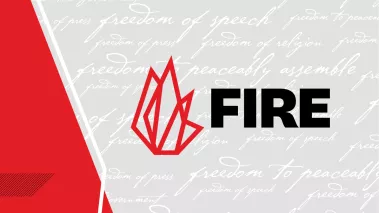Table of Contents
Victory at UCSD, but Deception Remains; Administration Drops Case Against The Koala

LA JOLLA, CA — On June 19, 2002, the University of California, San Diego announced that it had dropped its charge of "disruption" against a student humor publication, The Koala. Despite clear evidence to the contrary, UCSD claims that "neither the complaint nor the hearing concerned The Koala's editorial content." FIRE has been active in the case since early May, upholding the principles that the First Amendment restricts the authority of administrators of public universities and that students ought to be treated equally.
"The UCSD administration has failed to drive The Koala from campus," said Thor L. Halvorssen, executive director of FIRE, "but the threat of similar proceedings chills free speech on UCSD's campus. Students now know that they risk an inquisition from UCSD administrators who disregard the Bill of Rights when they don't approve of what is said."
The Koala is a satiric student humor publication. In November 2001, a student photographer (not a member of The Koala) sent it photographs that he had taken of a meeting of a student group, MEChA (Movimiento Estudiantil de Chicanos de Aztlán). The Koala then used the photographs in a critical parody of MEChA's president, Ernesto Martinez. In February 2002, UCSD charged The Koala with violating the Student Code's prohibition of "disruption of teaching, research, administration, disciplinary procedures, or other UCSD or University activities."
On May 22, 2002, FIRE wrote to remind UCSD of a 1995 case when another UCSD student publication, Voz Fronteriza, celebrated the death of a Latino Immigration and Naturalization Service officer and called for the murder of other such "race traitors." In that case, UCSD — including Vice Chancellor Joseph W. Watson, whose office oversaw this year's trial of The Koala — vigorously affirmed Voz Fronteriza's "right to publish their views without adverse administrative action, " because "student newspapers are protected by the first amendment of the U.S. constitution."
No such consideration was given to The Koala. In the 1995 Voz Fronteriza case, the UCSD administration issued a formal statement that the University was "legally prohibited from censuring the content of student publications." In March 2002, Vice Chancellor Watson wrote to "all academics . . . staff . . . and students at UCSD": "We condemn The Koala's abuse of the Constitutional guarantees of free expression and disfavor their unconscionable behavior."
FIRE possesses documents and emails showing that after the MEChA meeting in November 2001, the University encouraged official complaints from Ernesto Martinez, and instructed him on how to proceed legally and informally against The Koala. Director of Student Policy and Judicial Affairs Nicholas S. Aguilar — abandoning even the appearance of impartiality — denounced the "hate, bigotry, and intolerance" of The Koala. Aguilar encouraged Martinez to submit to his office "any complaints of alleged misconduct not based on the content of the publication." He further assured Martinez of his and the UCSD's administration's support of "the UCSD Principles of Community," which, in his view, Martinez was defending against The Koala.
Nevertheless, Aguilar did not recuse himself from the case.
UCSD's "Principles of Community" modify the First Amendment: "We affirm the right to freedom of expression at UCSD. We promote open expression of our individuality and our diversity within the bounds of courtesy, sensitivity, confidentiality and respect." Ironically, MEChA, by instructions of its National Constitution, orders each individual chapter to "orient" members around "El Plan Espiritual de Aztlán," which denounces "the brutal 'gringo' invasion of our territories" (an "Aztlán" nation that includes the Southwestern states of the United States of America) and refuses ownership of land to "the foreign Europeans."
"FIRE," Halvorssen observed, "would protect MEChA's right, under the U.S. Constitution, to argue for such a view, but we note that UCSD hypocritically and selectively violates both its own obligations to that Constitution and its own unconstitutional restrictions of speech on behalf of 'courtesy' and 'sensitivity.'"
In its proceedings against The Koala, UCSD showed far greater interest in convicting the publication than in upholding its obligations to the First Amendment. On May 22, 2002, the day that UCSD received its letter from FIRE, the UCSD Judicial Board opened the trial to the campus media. The UCSD administration refused to participate and left the hearing. Two days later, Aguilar, who had applauded Martinez, nullified the hearing and ordered a retrial behind closed doors. That secret trial was held on June 5, 2002. The dismissal of the charges nominally stems from this hearing.
"FIRE has been our staunchest ally throughout this ordeal," said George Liddle, editor-in-chief of The Koala. "Thanks to FIRE's efforts, the constitutional rights of The Koala have been defended against an administration seeking, in any way possible, to silence and disband our publication."
FIRE is a nonprofit educational foundation that unites civil rights and civil liberties leaders, scholars, journalists, and public intellectuals across the political and ideological spectrum on behalf of individual rights, due process rights, freedom of expression, and rights of conscience on our campuses.
Contact:
Thor L. Halvorssen, FIRE: 215-717-3473; fire@thefire.org
Joseph W. Watson, Vice Chancellor for Student Affairs: 858-534-4370; jwwatson@ucsd.edu
Nicholas S. Aguilar, Director of Student Policy and Judicial Affairs: 858-534-6225; naguilar@ucsd.edu
Robert C. Dynes, Chancellor, UCSD: 858-534-3135; dynesdesk@ucsd.edu
Recent Articles
FIRE’s award-winning Newsdesk covers the free speech news you need to stay informed.

University of Wisconsin academic freedom panel back on after effort to disinvite speaker

UConn Med now lets students opt out of DEI pledge of allegiance

FAN Special Dispatch: Photos of Freedom
